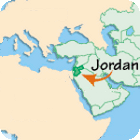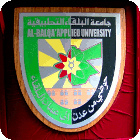 The Hashemite Kingdom of Jordan is classified as a lower–middle income country whose economy is based on the service sector (78.4% of GDP). It is located in the middle of a complex and dynamic political, social and economic sub-system between Iraq, Saudi Arabia, Syria, Palestine and Israel. Regional tensions have continuously impinged upon the country decision-making processes. Constrained by limited arable land, and scarce water, mineral and energy resources, Jordan agriculture contributes only with 3.7% to the GDP. Jordan’s geographical and climatic regions are extremely diverse. Differences in the climatic conditions lead to a variety of adaptations among plants.
The Hashemite Kingdom of Jordan is classified as a lower–middle income country whose economy is based on the service sector (78.4% of GDP). It is located in the middle of a complex and dynamic political, social and economic sub-system between Iraq, Saudi Arabia, Syria, Palestine and Israel. Regional tensions have continuously impinged upon the country decision-making processes. Constrained by limited arable land, and scarce water, mineral and energy resources, Jordan agriculture contributes only with 3.7% to the GDP. Jordan’s geographical and climatic regions are extremely diverse. Differences in the climatic conditions lead to a variety of adaptations among plants.
Jordan has a well-developed plant breeding programme composed by both public and private institutes. There is an increase in the number of staff involved in plant breeding activities in the public sector due to the annual increase of students enrolled in universities. Moreover, differences in the Jordanian climatic conditions lead to a variety of adaptations among plants which encouraged many international seed companies to invest and establish variety testing sites in Jordan by their own resources or as a joint venture with the Jordanian companies.
Generally, public institutes are more interested in germplasm enhancement and biotechnology while the private ones direct most of their resources toward line evaluation and development. The main crops targeted by plant breeding activities are wheat, barley, tomato, cucumber and watermelon.
The most important factor limiting the success of plant breeding programmes in Jordan is the inadequate knowledge level of the general plant breeding strategies, which means that there is no clear understanding of plant breeding programmes and its strategic goals. The lack of financial resources to carry out field and laboratory experiments is another important issue to development of plant breeding activities in the Hashemite Kingdom of Jordan.
Research and education institutes with activities in plant breeding
Public Institutions

|
NCARTT is the national research centre that started its breeding activities going back to 50 years ago, and working in biotechnology since 2001. The centre has a cooperation agreement with the International Center for Agricultural Research in Dry Areas (ICARDA) concerning the breeding program of small grains.
|

|
JUST is one of the 8 public universities. The plant breeding activities started in the beginning with germplasm enhancement and characterization of some wild species of wheat and barley. After 1999 and up until now, 90% of the resources are directed toward biotechnology and only 10% for germplasm enhancement.
|

|
The University of Jordan is a public university established in 1963 as the first university in Jordan. The plant breeding work goes back 30 years and plant biotechnology started since 20 years ago. This university works mainly on wheat, food legumes and vegetables. The resources allocated for the different crop groups are directed mostly toward germplasm enhancement. The second activity is line development.
|

|
Mutah is a public sector university involved only recently in plant breeding and biotechnology research activities. 80% of both financial and human resources is directed toward the breeding activities related to wheat and barley; the rest (15%) come from small grants to evaluate 10 varieties of Watermelon for disease resistance and a lentil nursery from ICARDA to be evaluated for drought. The farmer materials are the first source for plant germplasm used by the plant breeders in this university.
|

|
Al-Balqa University is a public sector university. The Faculty of Agriculture at Al-Balqa University was established 6 years ago. It is involved in plant breeding and biotechnology research activities since 2002 and 2001 respectively. Human and financial resources are all utilized in the vegetable crops breeding activities. Line development and line evaluation are taking only 30%, and 70% of the resources is directed toward germplasm enhancement.
|
Private Institutions

|
SAKATA is an international private company that has a regional office in Jordan. It has worked in plant breeding for the last 92 years but it will start its breeding activities in Jordan this year (2006). It is interested in vegetable crops only and all of its activities in Jordan will be on line evaluation at the beginning. It established 2 research stations, one in Jordan Valley and one in the highlands. The company concentrates on the private sector as a source for its germplasm. Sakata breeding program considers highly favorable traits as its high priority, biotic stresses medium priority and the lowest priority was given to abiotic stresses.
|

|
MCAD is a private company established in 1986. All its budget is used in plant breeding of vegetables (cucumber and tomato mainly) within which 50% is taken to line development activities. In their breeding program they are interested in highly favorable traits in yield and quality, the second priority is the resistance for biotic stresses and the lowest priority is the resistance for biotic stresses. 18 varieties were released between 2000 and 2004 for all vegetable crops targeted by the company.
|

|
Seminis
Website available in English
Seminis is an international group of companies. It has a regional office and an experimental station in Jordan. This company is interested in conventional plant breeding programs focused on vegetables. Lately this company was sold by Monsanto Company. It has been working in Jordan for the last 22 years. They concentrate most of their resources (80%) on line evaluation and only a minor portion of their resources (20%) on line development.
|

|
Sukhtian is a private company which works in seed production for the last 16 years. This company has many sectors, the smallest one being agriculture. The resources allocated for plant breeding are distributed by crops as following: 80% for vegetable crops and 20% for other grain legumes, mostly phaseolus. The entire resources utilization is for line evaluation activities.
|
 |
National Seed Company, (Mugdadi)
No Website available
The National Seed Company (Mugdadi), a private company, started its breeding work in the last seven years. The company doesn’t have any activities in biotechnology. All the plant breeding resources go to breeding vegetable crops, lead by cucumber, watermelon, cantaloupe and tomato. Human and financial resources by improvement activities are allocated 70% to line development, 20% to line evaluation and 10% to germplasm enhancement.
|
 |
Global Company
No Website available
The Global Company is a private company and has plant breeding activities since 11 years ago. This company has no plant biotechnology activities. The plant breeding program includes only 3 crops: cucumber, tomato and melon). The main activities are germplasm enhancement and line development.
|
 |
Al-Arabia Seed Company
No Website available
Al-Arabia is a private company which has been working in plant breeding for the last 12 years. This company doesn’t have any plant biotechnology activity. The only crop group that the company deals with is vegetables and the main breeding activity is line development.
|
 |
Barcelona Seed Company
No Website available
Al-Arabia is a private company. It has been working in plant breeding for the last 12 years. This company doesn’t have any plant biotechnology activity. The only crop group that the company deal with is vegetables (cucumber, tomato, cantaloupe, watermelon and peppers) and the main breeding activity is line development.
|
 |
Fouad Salamah establishment
No Website available
Created in 1985, Fouad Salamah establishment is a private company which allocates its whole budget to plant breeding activities. Most of these activities are done by the owner of the company and are carried out on vegetables only (mainly cucumber). Even though the financial resources for the breeding activities was low, this company reach up to 380 crosses and maintain 20 segregating populations.
|
Information by Mohammed Ajlouni (2006) - Information based on the Jordan's full report from the PBBC survey. Last revised 31-07-2009, GIPB
 The Hashemite Kingdom of Jordan is classified as a lower–middle income country whose economy is based on the service sector (78.4% of GDP). It is located in the middle of a complex and dynamic political, social and economic sub-system between Iraq, Saudi Arabia, Syria, Palestine and Israel. Regional tensions have continuously impinged upon the country decision-making processes. Constrained by limited arable land, and scarce water, mineral and energy resources, Jordan agriculture contributes only with 3.7% to the GDP. Jordan’s geographical and climatic regions are extremely diverse. Differences in the climatic conditions lead to a variety of adaptations among plants.
The Hashemite Kingdom of Jordan is classified as a lower–middle income country whose economy is based on the service sector (78.4% of GDP). It is located in the middle of a complex and dynamic political, social and economic sub-system between Iraq, Saudi Arabia, Syria, Palestine and Israel. Regional tensions have continuously impinged upon the country decision-making processes. Constrained by limited arable land, and scarce water, mineral and energy resources, Jordan agriculture contributes only with 3.7% to the GDP. Jordan’s geographical and climatic regions are extremely diverse. Differences in the climatic conditions lead to a variety of adaptations among plants.













